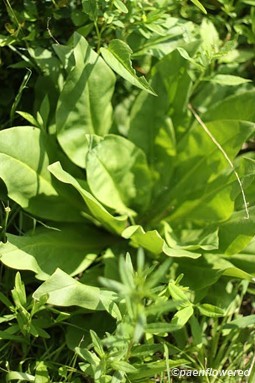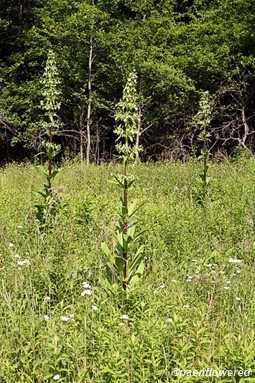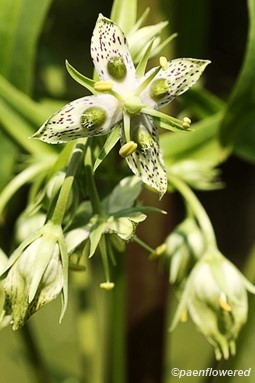Frasera caroliniensis
Frasera caroliniensis American columbo
Add to MyPlants View Locations
Frasera caroliniensis is an unusual plant. It is the only member of its genus found in the eastern U.S. and one of just a few that grow outside of desert habitats. It can persist for years as a rosette of leaves that looks like a head of lettuce, but if a population has enough sunlight and enough years to mature, dozens of three-to-eight-foot plants will - simultaneously - shoot up over the course of a few weeks (June in PA), bloom aggressively, and then set seed and die (thus making it "monocarpic").
Its flowers have four large sepals that branch out from the central ovary and four white to light green petals, each with purple spots and a conspicuous, fringed nectar pad. Leaves are three to twelve inches long and, in a year in which the plant blooms, extend all the way up the plant’s red to purple stem.
F. caroliniensis is most common in the Midwest and Great Lakes region, but populations may also be found from Oklahoma to Georgia in the South. It is only present in a handful of counties in Northwestern Pennsylvania and is thus listed as endangered in our state. Its biggest threats here are habitat loss and forest succession – as the canopy closes over a population, the plants cannot get enough sunlight to store up the energy to bloom and reproduce, leaving them stuck in the rosette phase of their lives indefinitely.
Sources:
Haywood, Mary Joy and Phyllis Monk. Wildflowers of Pennsylvania. Pittsburgh: Botanical Society of Western Pennsylvania, 2001.
Hilty, John. American Columbo (Frasera caroliniensis). Illinois Wildflowers. Copyright 2002-2020. Available at American columbo.
Habitat & Range
Rare in open deciduous woods on calcerous soils.
Found in the north-west in Mercer, Venango, Forest, Lawrence, Butler and Clarion Cos.
Wetland code: Not classified
Phenology
Flowers May & June.
Plant Codes
PA status: PE (Endangered)
S-rank: S1 (Critically imperiled)
G-rank: G5 (Secure)
Frasera caroliniensis American columbo
Synonyms: Swertia caroliniensisAdd to MyPlants View Locations




Comments
Have you spotted this plant in your area? We'd love to hear about your experience! Share your comments or questions about the plant below. Comments are moderated before posting.